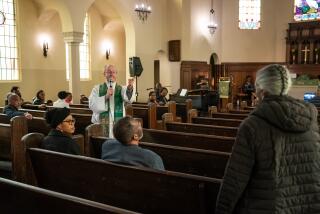Seeking a Revival in New Orleans
- Share via
NEW ORLEANS — Hoping for resurrection as Easter approached, the congregation of one of this city’s oldest and most historic churches gathered Sunday for what might have been its last Mass as a parish.
The parish of St. Augustine Roman Catholic Church, which has become a focal point for this city’s jazz culture, is scheduled to close this week and merge with another.
Protesting the closure of the parish has been a rallying point for residents in the aftermath of hurricanes Katrina and Rita, which destroyed so much of the city’s cultural patrimony.
The decision has been met with opposition from politicians, editorial writers and parishioners, some of whom appealed the decision to New Orleans Archbishop Alfred C. Hughes last week. A response is expected this week.
New Orleans Councilwoman Jacquelyn Brechtel Clarkson told the congregation Sunday that the church was a place where people of all races could sit and worship together in unity.
“If this city ever needed anything right now, it’s that,” she said.
Joining parishioners were jazz pianist Ellis Marsalis and two of his sons, trombonist Delfeayo and saxophonist Branford.
Parishioners stood in the aisles and clapped as the Marsalises and the church band and choir rocked through “Down by the Riverside,” “This Little Light of Mine” and “When the Saints Go Marching In.”
St. Augustine is one of the oldest African American Catholic parishes in America, in the nation’s oldest predominantly black neighborhood, known as Treme, two blocks north of the French Quarter. It has been a cornerstone of the city’s African American community, and in recent years has been a place where tourists have come to experience the city’s intricate mix of music, race and culture.
St. Augustine “has monumental importance to music in this city,” Ellis Marsalis said in an interview. “It can be a good way in which to rally people around the [hurricane] recovery effort. This church is sort of like discovering a mountain with gold inside it.”
The church opened in 1841 as a place where whites, slaves and so-called free men of color -- blacks who had never been enslaved -- worshiped together.
Over the decades, it followed the city’s transformation. Parts of the church were built by slaves, parts by French and Italian immigrants. It was exclusively white during the days of racial segregation, then became exclusively black for many years after the civil rights movement.
In recent years, St. Augustine has returned to its multicultural roots, attracting African Americans, Creoles and whites from across the New Orleans area while weaving jazz and gospel music into its Masses.
Last month, the Archdiocese of New Orleans announced it would close St. Augustine parish as part of its post-Katrina restructuring. It had been scheduled to close for several years, archdiocese officials said, as Treme gentrified and the Catholic population in the area dropped steadily. Hurricanes Katrina and Rita hurried that process along, they said.
Weekly Mass will still be held at the church, but weddings, funerals and other services would be transferred to a parish several blocks away.
In addition, the church will lose its priest, Father Jerome LeDoux, a 76-year-old former theology professor -- and an aspiring novelist -- who is considered one of New Orleans’ most charismatic religious figures.
Since taking over the church in 1990, LeDoux has introduced jazz and gospel music into the services. He presides over jazz funerals, with marching bands that routinely return to the church for a party after the burial. LeDoux has initiated an annual “Louis Armstrong Jazz Mass” and a Mass in honor of the “Unknown Slave.”
St. Augustine was one of the first Catholic parishes to reopen after Katrina. Parishioners said its declining membership had rebounded because other churches had been unable to open and church attendance had risen among hurricane survivors.
“Taking a pre-K snapshot to make post-K decisions is something we’re trying to talk to the archdiocese about,” said Linda Santi, a member of the parish’s publicity committee.
No one was ready to say goodbye Sunday.
“We’ve been carrying this cross one whole long month,” said Sandra Gordon, president of the parish council, of the closure decision. This week “we will celebrate our victory. Our church will be resurrected.”
LeDoux said that if the parish closed, he would “go where I’m sent by my religious superiors.” But he lamented that the decision to close the parish came as it had returned to its multiracial origins.
“Blame that on two evil women named Katrina and Rita,” LeDoux said outside his church after Mass, as parishioners came up to hug him and have their picture taken with him. “They upset the apple cart. Now it’s up to God and Archbishop Hughes.”
More to Read
Sign up for Essential California
The most important California stories and recommendations in your inbox every morning.
You may occasionally receive promotional content from the Los Angeles Times.










